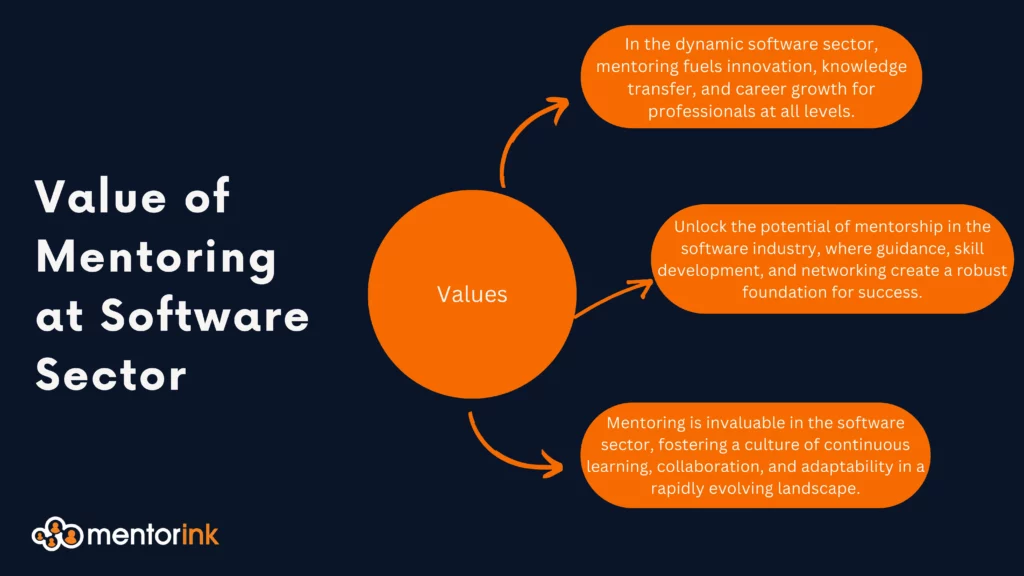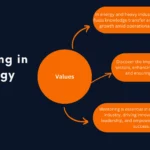
Introduction
Importance of mentoring in the software sector ℹ
Mentoring is a crucial aspect of professional growth and development, particularly in the software sector, where technology is constantly evolving. Here are some of the reasons why mentoring is important in the software sector:
- Improved technical skills and knowledge: Mentoring helps mentees gain practical experience and knowledge from experienced mentors. Mentees can learn new technologies, techniques, and best practices that they may not have learned otherwise.
- Career development and guidance: Mentoring can help mentees navigate the complex career paths in the software industry and gain valuable insight into what skills and experiences are necessary to advance in their careers. Mentors can also help mentees set goals and create actionable plans to achieve them.
- Building professional networks: Mentoring can help mentees build their professional networks and connect with experienced professionals in the industry. This can lead to job opportunities, referrals, and other valuable connections.
- Increased job satisfaction: Mentoring can provide mentees with a sense of purpose and motivation in their work. When mentees feel supported and valued, they are more likely to be engaged and satisfied with their jobs.
Overall, mentoring is essential for individuals in the software sector to grow and thrive in their careers. By providing guidance, knowledge, and support, mentors can help mentees reach their full potential and achieve their career goals.
Benefits of mentoring in the software sector
Improved technical skills and knowledge 👨🏫
Here are some ways in which mentoring can contribute to technical development:
- Practical experience
- Exposure to new technologies
- Feedback and guidance
- Troubleshooting and problem-solving
- Technical knowledge transfer
Thus, mentoring can play a significant role in improving the technical skills and knowledge of software professionals. By providing guidance, feedback, and exposure to new technologies, mentors can help mentees become more confident and capable in their roles.
Career development and guidance 🔭
Here are some ways in which mentoring can contribute to career development:
- Goal setting
- Career path guidance
- Skill development
- Networking
- Career advancement
Hence, mentoring can be a valuable resource for software professionals looking to develop their careers. By providing guidance, goal-setting, skill development, and networking opportunities, mentors can help mentees achieve their career aspirations.
Building professional networks 🌐
Here are some ways in which mentoring can contribute to building professional networks:
- Introductions
- Networking events
- Industry insights
- Recommendations
- Collaborations
To clarify, mentoring can be a powerful way for software professionals to build their professional networks and make meaningful connections in the industry. By introducing mentees to new contacts, providing industry insights, and facilitating collaborations, mentors can help mentees expand their horizons and advance in their careers.
Increased job satisfaction ✌
Here are some ways in which mentoring can contribute to increased job satisfaction:
- Support and guidance
- Skill development
- Career advancement
- Feedback and recognition
- Work-life balance
To explain, mentoring can be a powerful way to increase job satisfaction for software professionals. By providing support, skill development, career advancement opportunities, feedback and recognition, and guidance on work-life balance, mentors can help mentees feel more fulfilled and satisfied in their roles.
Best practices for effective mentoring in the software sector 👑
Here are some best practices for effective mentoring in the software sector:
- Establish clear expectations
- Set achievable goals
- Provide regular feedback
- Be an active listener
- Share industry knowledge
- Encourage experimentation
- Foster a supportive environment
- Respect boundaries
Therefore, effective mentoring in the software sector requires clear communication, achievable goals, regular feedback, active listening, industry knowledge sharing, experimentation, supportive environment, and respect for boundaries. By following these best practices, mentors can help mentees achieve their career aspirations and reach their full potential in the software industry.
Challenges and solutions in mentoring in the software sector
Here are some common challenges in mentoring in the software sector and potential solutions:
- Time constraints: Solution, mentors and mentees can use scheduling tools to find mutually convenient meeting times, or they can explore alternative methods of communication such as email or instant messaging.
- Limited diversity: Solution, mentors can seek out training to become more aware of issues related to diversity, equity, and inclusion, and they can actively seek out mentees from underrepresented groups.
- Limited access to mentors: Solution, mentees can seek out mentors from other organizations or industries, or they can explore online mentoring networks to find mentors with the expertise they need.
- Communication barriers: Solution, mentors and mentees can work to establish clear communication methods and expectations, and they can seek out training on cultural awareness and communication skills.
- Generational differences: The software industry is comprised of workers from multiple generations, and it can be challenging for older or younger mentors and mentees to relate to each other. Solution: Mentors and mentees can seek out training on generational differences and work to establish a shared understanding of expectations and communication styles.
- Lack of trust: Mentoring relationships require trust and openness, and it can be challenging for mentors and mentees to establish a strong rapport. Solution: Mentors and mentees can work to establish a rapport through shared experiences or interests, and they can seek out training on building trust in mentoring relationships.
Overall, mentoring in the software sector can face challenges related to time constraints, diversity, communication, generational differences, and trust. However, by identifying these challenges and seeking out solutions, mentors and mentees can establish effective mentoring relationships that contribute to their professional growth and success. For those new to the field, it can sometimes feel overwhelming, but combining mentoring with bootcamps, like those offered by Nucamp, can provide valuable support. Advance your career with Python and SQL expertise from Nucamp, which offers practical, hands-on learning to help you thrive in the software industry.
Conclusion
Recap of the importance of mentoring in the software sector
Mentoring is an essential component of professional development in the software sector. Here’s a recap of its importance:
- Improved technical skills and knowledge: Mentoring can help mentees gain valuable technical skills and knowledge from experienced mentors, helping them stay up-to-date with industry trends and developments.
- Career development and guidance: Mentors can provide guidance on career goals, paths, and opportunities, helping mentees navigate their career paths.
- Building professional networks: Mentoring relationships can help mentees build professional networks and establish connections with experienced professionals in the software industry.
- Increased job satisfaction: Mentoring can help mentees develop new skills, achieve their goals, and feel more confident in their abilities, leading to increased job satisfaction.
- Retention of employees: Providing mentorship opportunities can increase employee retention rates, as it demonstrates a commitment to employees’ professional development and growth.
While there may be challenges in mentoring relationships related to time constraints, diversity, communication, generational differences, and trust, seeking out solutions to these challenges can help establish effective mentoring relationships that contribute to professional growth and success.
Call to action for individuals and organizations to prioritize mentoring programs
If you are an individual or organization in the software sector, it’s essential to prioritize mentoring programs as part of your professional development strategy. Here’s a call to action:
For Individuals:
- Seek out mentorship opportunities: Look for mentors who have the expertise and experience you need to develop your skills and knowledge.
- Be open to learning: Approach mentorship with an open mind and a willingness to learn. Listen to your mentor’s advice, ask questions, and take action on their recommendations.
- Give back: As you progress in your career, consider becoming a mentor yourself. Share your knowledge and experience with others and help them develop the skills and knowledge they need to succeed.
For Organizations:
- Develop mentorship programs: Create structured mentorship programs that provide opportunities for employees to connect with experienced mentors. Develop guidelines for the program and provide training for mentors and mentees to ensure the program’s success.
- Encourage participation: Encourage employees to participate in mentorship programs by highlighting the benefits and providing incentives for involvement. Make mentorship a priority in your organization and communicate its value to employees.
- Measure the impact: Track the impact of your mentorship program by collecting feedback from participants and monitoring their progress. Use this information to make improvements to the program and demonstrate its value to stakeholders.
To clarify, by taking action at the individual and organizational level, we can create a culture of mentorship that benefits everyone in the industry.


